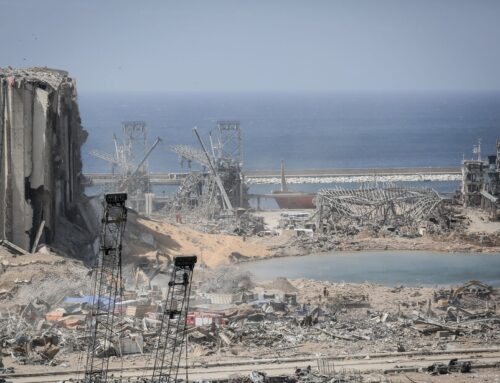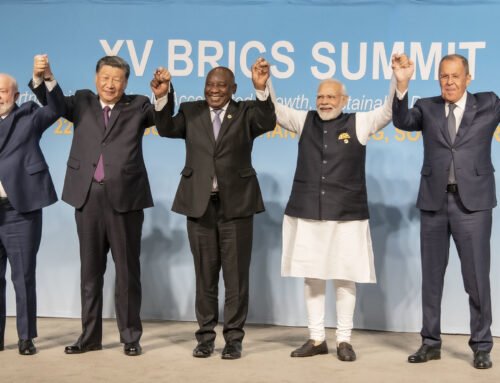Pulaski_Policy_Paper_Wywiad_gospodarczy
Autor foto: Domena publiczna

The economic intelligence system as a crucial factor in the success of the Responsible Development Plan
June 8, 2017
Author: Grzegorz Małecki




Pulaski_Policy_Paper_Wywiad_gospodarczy
Autor foto: Domena publiczna
The economic intelligence system as a crucial factor in the success of the Responsible Development Plan
Author: Grzegorz Małecki
Published: June 8, 2017
Pulaski Policy Paper no 11, June 8, 2017
Over the past two decades, the economy has undoubtedly become the main battleground in the struggle for global supremacy among great powers. Given the function of modern states, geoeconomics is gradually replacing geopolitics as a dominant paradigm due to the unpredictable nature of the world and multipolarity in international politics. Therefore, it seems necessary to redefine the term ‘national security’ and consider economic security to be a high priority. This phenomenon has been recognized by leading economic powers a long time ago. The fundamental changes to the perception of global politics sparked further developments. In the 1990s, the world’s most powerful economies made a decision to modify tasks, structure and the function of the public institutions responsible for the national security, including diplomatic services and intelligence agencies. Economic security has become a priority shortly thereafter. Economic intelligence is crucial to achieve this objective. All entities involved in this process have been merged into a well-organized structure which is known as an economic intelligence system. The system consists of public institutions (such as special services, diplomacy, foreign trade agencies and their branches overseas); multinational corporations; small and large enterprises (both state-owned and private); scientists and experts. There are various models of economic intelligence systems around the world, which are based on tradition, culture, as well as the structure and potential of national economy. Despite these differences, the main objective of all economic intelligence systems is to support the decision-making as far as the economic policy and national economic interests are concerned. In this context, it is worth emphasizing the most important research subjects of the economic intelligence, such as market competition, scarce natural resources and strategic sectors of the economy.
Economic intelligence in the service of the state
The term ‘economic intelligence’ was used for the first time in the book Competitive strategy: techniques for analyzing industries and competitors written by Michael Porter, a professor at Harvard Business School. However, the term has become really popular in the 1990s after the publication of Henri Martre’s report entitled Intelligence economique et strategie des enterprises in 1994. This issue struck a chord especially in France, therefore, the government established a position of the High Representative for Economic Intelligence to the Prime Minister in 2004. Over the past few years the economic intelligence system has been systematically improved. The government introduced the latest changes in 2016, when the Strategic Information and Economic Security Service was founded (Fr. Service de l’information stratégique et sécurité économiques, SISSE).
Generally speaking, the economic intelligence can be defined as a strategy, which is crucial for preventing economic threats to national security. Thus, this term in not restricted to the special services but can be understood as multidisciplinary actions such as identification, search, assessment, production and distribution of information on financial, economic and corporate matters, which are particularly important for public institutions and companies. These operations are initiated, conducted and coordinated by the public administration in order to ensure national security in terms of defence of national interests of individuals, companies and strategic industries in the country and abroad.
One of primary objectives of economic intelligence is to develop competitiveness by providing consulting services and support economic processes. Furthermore, economic intelligence is supposed to secure and expand country’s influence and an impact of companies located on its territory at an international level. Thus, economic intelligence is a tool to gain a knowledge, which can be used to influence the environment, optimize decision-making and improve companies’ positioning strategies to ensure wealth, prosperity and citizens’ security.
Economic intelligence systems in leading countries
For over 20 years, economic intelligence systems in the West have been ensuring economic security as an inherent part of national security. Various legal, organizational and institutional regulations have been introduced around the world to maximize the efficiency of economic intelligence. Results of these mechanisms are analysed systematically and used to improve and optimise the regulations. France and Japan are undoubtedly the most creative and innovative countries in the field of economic intelligence services. There are some differences between these models, particularly as far as the centralisation and state control over these processes are concerned. Both systems, however, place great emphasis on supporting international expansion of domestic companies.
Japan’s economic intelligence system, whose core and foundations are based on the Ministry of International Trade and Industry (MITI), is certainly one of the most developed and coherent systems all over the world. The system has been developed in seven strategic dimensions, which are strictly coordinated ‘from top to bottom’ (vertically). The system consists of both private and public institutions; companies, multinational corporations and government agencies. The strategic dimensions of the Japanese economic intelligence system are as follows:
- Both global and local approach to markets (the so-called globalisation);
- Trading strategies, which are precisely adapted to the economic and cultural context of each country;
- A long-term economic strategy;
- Precise and detailed information policy, which is also applied by private companies in accordance with a daily reporting system;
- Integration and coordination of economic hubs;
- Prudential and selective distribution of information based on access level;
- Corporate training programs for young professionals aimed at providing and improving specific skills, including understanding of local culture and languages, depending on companies and their locations.
A common attribute of leading economic intelligence systems is coordination and integration of actions taken at the state (administration), corporate, and individual level (including the academic level). Therefore, the economic intelligence system ought to be perceived as a joint effort of all actors involved in economic processes whose common goal is to ensure state’s economic security.
The coordination and integration at these three levels are visible in various forms and phases; one of the most important is to define objectives and needs of respective spheres and economic agents. Various organizational and institutional approaches have applied around the world in order to provide an effective dialogue among the economic agents as well as understand and fulfil their needs as far as the economic intelligence is concerned.
In most of European countries, as opposed to the United States, the administrative structures of the government have a decisive role in terms of centralisation and coordination of all actions taken by participants of the system. Special services play a significant role in the system; their importance, however, is related to auxiliary and executive tasks. The academic world, think tanks and also private companies are permanent participants of the economic intelligence system.
Three dimensions of economic intelligence
Economic intelligence operations take place in three dimensions. Given the significance of strategic information in decision-making processes connected with economy, finance, trade and industry, the active dimension is of primary importance; it embraces the variety of strategic data collection methods in accordance with all laws and regulations. Systematic access to credible knowledge about processes and phenomena, which are crucial to the state’s economic interest, allows to minimise the insecurity of decision-making and thus to improve the economic competitiveness of states and companies in the global economy.
The second dimension of economic intelligence is related to the security, which basically means to monitor the strategic sectors of the economy. Furthermore, economic intelligence ought to neutralize threats to the efficiency of the economic policy, such as negative externalities which affect global financial markets and disrupt the proper functioning of market mechanisms. The economic intelligence system is also crucial to counteract the negative effects of transnational organized crime and terrorism.
Offensive operations constitute the third dimension of economic intelligence. Their primary objective is to wield influence in order to strengthen the presence of the state and national entities in the global economy, particularly in the markets of strategic importance and the others, which for some reason are crucial to the national interest. Given the understanding of phenomena, tendencies and economic processes provided by the economic intelligence system, the state is capable to stimulate some of them by using legal methods in order to improve the efficiency of national economy and compete for markets, natural resources and investments within the global economy.
The lack of economic intelligence capabilities in Poland
The conditions in Poland differ considerably from those in Japan or France. In Poland, there is practically no use of the term ‘economic intelligence’ as far as the meaning of these words around the world is concerned. This term has rather a specialised meaning as a domain of special services and usually is connected with the term ‘economic espionage’. This term has a significantly different meaning, which is related to special operations during the Cold War, e.g. communist special services engaged in industrial espionage in the West. Regardless of terminological matters, there is no doubt that Poland lacks tradition, structures, mechanisms and tools of economic intelligence, that is, a coherent and coordinated set of public institutions and entities, multinational corporations, private companies, local self-governments, educational entities and experts which constitute an intelligence system intended to ensure economic security. Some public entities are supposed to perform tasks related to these issues, for example special services, particularly the Foreign Intelligence Agency (Pol. Agencja Wywiadu) and the Internal Security Agency (Pol. Agencja Bezpieczeństwa Wewnętrznego). Their tasks, however, have a defensive profile and thus omit ‘offensive’ operations and the sphere of influence. Despite the theoretical role of special services, the defensive dimension of their operations is usually limited to the largest state-owned companies (the so-called sole-shareholder companies of the State Treasury), which operate in strategic sectors. Furthermore, most of their efforts are focused on the fight against corruption and economic offences. These institutions, however, are not involved in crime prevention and do perform neither advisory functions nor a proactive role. Some tasks of the economic intelligence system are also performed by public international investment agencies, the Ministry of Foreign Affairs and its foreign branches, employer’s associations, chambers of commerce and local self-governments. Nevertheless, the efforts of these institutions are dispersed, uncoordinated and lack the substantive research. As a result, these actions are spontaneous and based on rather an intuitive approach, instead of having attributes of well-planned strategies made on the basis of comprehensive knowledge and research, which embrace both domestic and international conditions. These circumstances ought to be perceived as wasting potential of the Polish economy and the chance to improve its performance, particularly as far as the international expansion is concerned.
The economic intelligence system as an instrument of Minister Morawiecki’s Plan
The Responsible Development Plan, that is the so-called Minister Morawiecki’s Plan, is undoubtedly an opportunity to improve the current situation in Poland and build a modern economic intelligence system based on international standards. The system seems to be a highly desirable instrument to support a complex concept of economic modernization of Poland, which certainly represents an innovative approach. The economic intelligence system may complement and support the effectiveness of governmental reforms, provide new solutions for the government and economic agents based on current conditions in the world economy, and improve the competitiveness of Polish entities in comparison with other governmental and non-governmental business actors around the world.
There is no denying that the Responsible Development Plan should be supported by new instruments of economic intelligence, especially in the field of international expansion of Polish companies. Recently, the Ministry of Development announced a plan to redevelop the structure and functions of its foreign branches and offices. This fact seems to be an opportunity to implement new solutions and instruments. Moreover, this experience and future successes might be also used to support initiatives in other sectors of the Polish economy, in order to build well-planned and efficient economic intelligence system.
The role of a private sector in the economic intelligence system
Development of the economic intelligence system requires not only governmental institutional solutions, but also the stimulation of other non-governmental actors, which are crucial to the project’s success. It is worth pointing out the significance of experts, academia and private companies, which provide services related to the so-called competitive intelligence. This phenomenon is an equivalent of economic intelligence at the private and corporate level. Its main task is to fulfil needs and requirements of the private sector. Given the limited capabilities of the public institutions and intelligence agencies, even the most developed countries are not able to provide all necessary information for all economic agents. The public administration can embrace only the largest and the most important economic actors, however, the public system is also supposed to stimulate and encourage other members of the system to use competitive intelligence services offered by non-governmental institutions. Their engagement is undoubtedly crucial to the entire economic intelligence system, therefore, the government is responsible for creating optimal legal, organizational and technical conditions for professionals and supporting development of high-quality services in this sector.
Conclusions and recommendations
1. Poland lacks systemic mechanisms connected with economic intelligence. The main issue is a lack of coordinated actions, strategic vision as well as modern and efficient instruments to perform these tasks. Special services play a key role in providing economic intelligence support; however, in Poland, these institutions are focused on defensive and coercive actions which are restricted to a limited number of public entities.
2. Given growing economic competition in the global economy, it seems crucial to work out and implement a development strategy for Poland’s economic intelligence system. The system is absolutely necessary to guarantee fair international competition between Polish and foreign companies, which are supported by economic intelligence units in their countries.
3. The so-called Minister Morawiecki’s Plan, is undoubtedly an opportunity to improve the current situation in Poland and build a modern economic intelligence system based on international standards.
4. Support for the international expansion of Polish companies seems to be the most important field as far as the economic intelligence system is concerned. Therefore, redevelopment of the structure of foreign branches and offices of the Ministry of Development ought to be perceived as a priority.
Author: Grzegorz Małecki, Director of the Economy and Energy Programme at Casmir Pulaski Foundation





